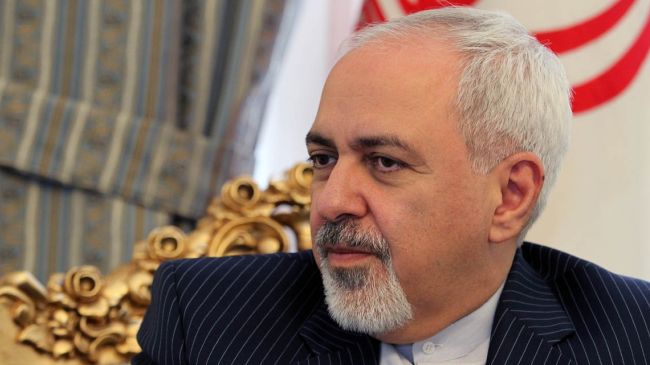 Iranian Foreign Minister Mohammad Javad Zarif says the Iranian delegation’s visit to New York marked the beginning of the country’s new foreign diplomacy.
Iranian Foreign Minister Mohammad Javad Zarif says the Iranian delegation’s visit to New York marked the beginning of the country’s new foreign diplomacy.
Zarif said on Saturday that the isolation of anti-Iranian tendencies at the United Nations and American media was one of achievements of the trip to New York.
“We will not allow [Israeli Premier Benjamin] Netanyahu to decide for our nuclear talks, because the Zionist regime is the greatest nuclear threat in the world,” Zarif added.
Zarif said that the Iranian delegation’s visit to New York marked the beginning of the administration’s international foreign diplomacy.
Commenting on Iran’s upcoming nuclear talks with the five permanent members of the UN Security council - Britain, China, France, Russia, and the United States plus Germany-, Zarif said the Geneva meeting would be the first stage of addressing details which is a necessary part of serious negotiations.
The Iranian Foreign Minister said he and EU foreign policy chief Catherine Ashton would be present at the Geneva negotiations but the level of talks has not been determined yet.
Iran and the six major world powers have held several rounds of talks on a range of issues, with the main focus being on Tehran’s nuclear energy program.
The foreign ministers of Iran and the six countries held their latest round of negotiations at the United Nations headquarters in New York on September 26.
The UN meeting was chaired by Lady Ashton, who announced that the parties would meet again in Geneva on October 15-16 to discuss Iran’s nuclear program.
After the meeting, British Foreign Secretary William Hague said, “The tone and spirit of the meeting we've had has been very good, and indeed a big improvement on the tone and spirit of previous meetings on this issue and I pay tribute to minister Zarif for that.”
US Secretary of State John Kerry also said Washington could begin removing bans on Tehran within months if “transparent process is in place” over the nuclear issue.
The United States, Israel and some of their allies have repeatedly accused Iran of pursuing non-civilian objectives in its nuclear energy program, with the US and the European Union using the unsubstantiated claim as an excuse to impose illegal sanctions against Tehran.
The bans come on top of four rounds of US-instigated UN Security Council sanctions against Iran under the same pretext.
Iran has categorically rejected the allegation, stressing that as a committed member of the International Atomic Energy Agency and a signatory to the Non-Proliferation Treaty, it is entitled to develop nuclear technology for peaceful purposes.
By Press TV
The Iran Project is not responsible for the content of quoted articles.

 QR code
QR code